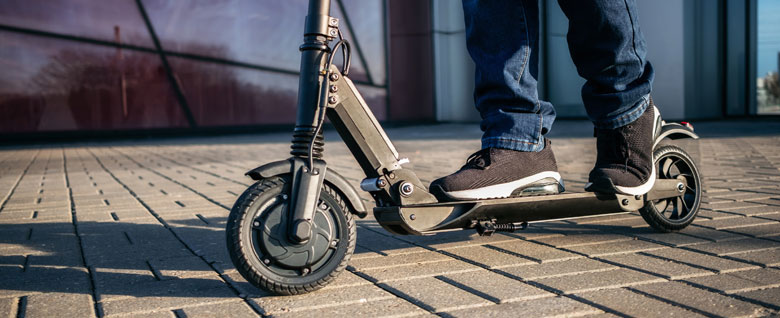With the government’s trial of e-scooters in many parts of the country very much underway, what do people using or intending to use them need to know?
The motorised ride-on vehicles are being used in trials in around 32 UK cities as part of the government’s Future of Transport Regulatory Review but are an increasingly common sight on roads and pavements around the UK. It is hoped that they become popular as an eco-friendly way of getting around.
Are e-scooters legal?
Although it is not illegal to buy, sell or own an e scooter, it is illegal to use one in public if it is not rented as part of a recognised government trial scheme. Using an e-scooter on private land is legal but for public use they are classed as motor vehicles, which means e-scooters are subject to the same laws that govern the use of cars and other motor vehicles.
It is therefore illegal to ride them on footpaths and pavements and in cycle lanes and pedestrian-only zones.
To be ridden on public roads e scooters need to conform to the same rules as cars, with licence plates, indicators and rear lights. MOT, tax and insurance are also required. A driving licence, full or provisional with a Q entitlement is also required. However, e-scooters that are currently on sale don’t comply with these conditions.
If an e-scooter rider is caught riding in breach of the law, they will face the same penalties as other road vehicle users. A recent case in Cumberland saw a rider fined and banned from driving for 40 months for riding under the influence of alcohol and there are other examples around the country.
Are there any exceptions?
One exception to these laws are e-scooters that are part of a government-approved trial in one of the selected UK cities. These e-scooters can be ridden on the roads and in cycle lanes, but not pavements, and their maximum speed is limited to 15.5 mph, sometimes less. However, e-scooters that are on sale to the public can reach speeds of up to 50 mph. The government trial scooters are insured by the operators.
Are e-scooters dangerous?
There is an increasing number of recent news stories about incidents involving e-scooters. 2019 saw the first death following a crash while riding an e-scooter. In 2020 an e-scooter rider died after crashing into a parked car. In June 2021, a 20 year old rider also died from injuries suffered after his e-scooter collided with a car. And in July 2021 a 16-year-old was knocked off his scooter and killed by a hit-and-run driver.
The government advises riders in the trials to wear a helmet, but they are not legally required to. Further safety rules can be found on the GOV.UK website.
There have also been growing reports of pedestrians being hit by e-scooters, sometimes suffering serious injuries. There are growing concerns that e-scooters are creating ‘no go’ areas for people, in particular, visually or hearing impaired people, wheelchair users and others that are vulnerable. There have been complaints of e-scooters being abandoned and therefore becoming a potential tripping hazard.
The exact number of crashes and injuries associated with e-scooters is unclear. The Metropolitan Police have said it believes the number of incidents is under-reported, but that numbers are increasing sharply. In London, the number of reported collisions jumped from four in 2018 to 32 in 2019.
According to an investigation by ITV’s Tonight programme there have been 1,100 complaints and 210 people have suffered injuries in incidents involving e-scooters since the trials began.
Transport for London carried out a comparison between cycling and e-scooter injuries using data from the US and concluded that the rate of serious injuries was around 100 times more for e-scooter rides than cyclists.
So, what next?
With these worrying statistics on e-scooter accidents, calls for a review of the trials and e-scooters generally are increasing. Any such review, however, must include both the government trials and private e-scooters to ensure the same laws cover both and more consideration paid to the safety of riders, pedestrians and other road users
At Stephensons we deal with all kinds of personal injury claim. if you are a pedestrian or motorist who has suffered injury as a result of a collision with an e-scooter contact our experienced personal injury team on 0161 696 6235 or complete our online enquiry form.
By Angeline Holmes, paralegal



Comments